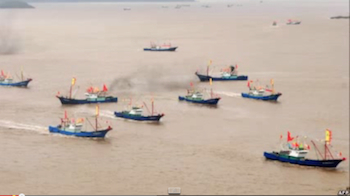When U.S. fishing stocks are deemed fished beyond sustainable levels, it means a cut in fishing and a shrinking number of commercial fishing boats. In some places fleets face extinction, like in Maine, New Hampshire and parts of Massachusetts, where the loss of an iconic species, cod, could mean the end of the inshore fleet.
In response to dwindling inshore stocks, China’s fishing fleets have expanded so they can reach fisheries around the world. YouTube screenshot.So it is interesting to see a vastly different approach to diminished fish stocks on the other side of the globe. In China, the loss of nearshore fisheries from overexploitation and pollution has led to the expansion of fishing fleets. The number of fishing boats is not just expanding but rapidly so to reach fishing stocks around the world.
China’s demand for fish is huge. Not only is it the largest consumer of fish, it is also the world’s largest producer and exporter. In response to that demand, the country has invested in a global fleet of more than 2,000 boats that fish around the world. Though it reported an annual catch of 368,000 tons, a European Parliament study estimated the annual catch is around 4.6 million tons, mostly fished near Africa but also near Asia, Central and South America, and Antarctica.
The scariest thing to me is the inability to cooperate with other countries. In a book about the contested waters, “The South China Sea: The Struggle for Power in Asia,” author Bill Hayton recounts problems with disputed territory there. In the South China Sea, China has been using its growing world dominance to assert its rights to resources on waters that have traditionally belonged to nations like Taiwan, Vietnam and the Philippines.
That of course has led to problems with fish stocks. According to Hayton, the Philippines provides a quarter of the canned tuna on American supermarket shelves. The recorded catch grew from 870,000 tons in 2001 to 1.9 million in 2008, but it has since dropped to 1.6 million in 2010 — not because of decreased demand but decreased fish.
For all the millions who depend on a healthy tuna supply, an agreement to jointly manage the tuna has been blocked by the region’s contested waters. The countries can’t even agree on an investigation to determine the health of the fishery.
“All countries around the sea depend upon cheap supplies of fish to feed their populations,” he writes. “In the absence of any agreement to safeguard the stocks, increasing short-term exploitation is putting all countries in the region at risk of a major food crisis. If China and its neighbors can’t agree on basic steps to avoid the risk of starvation, how likely are they to reach agreement on wider issues of sovereignty and territory?”
Our ability to manage our shared fishing stocks can provide lessons on how to manage (or not manage) other valuable resources, like water in California. In a best-case scenario, well-managed fisheries could be a role model to the rest of the world of how to do it right. In a worst-case scenario, the decrease of fish populations from bad management and an inability to agree can be a sign of troubles to come.







